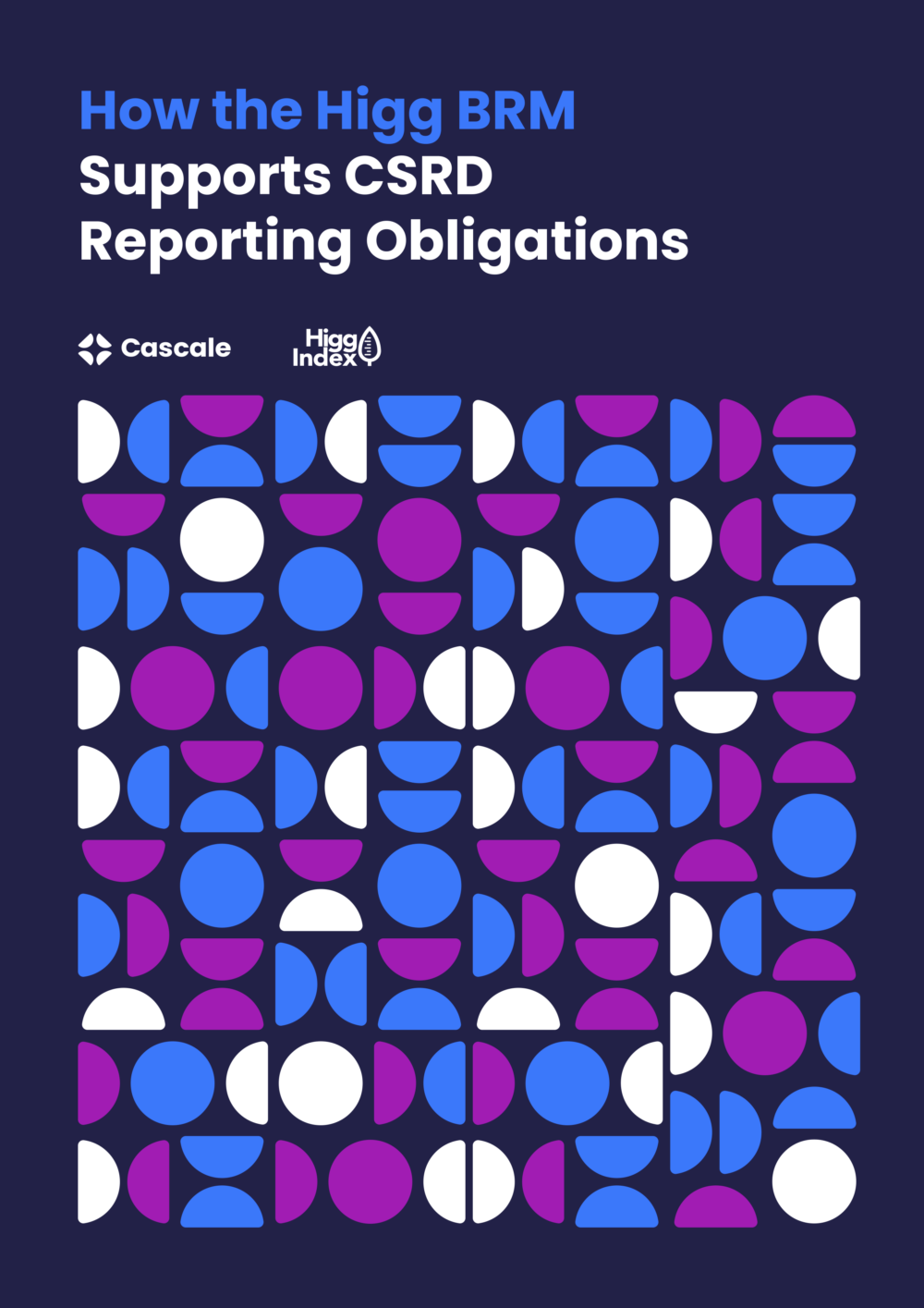
How the Higg BRM Supports CSRD Reporting Obligations
Now Available: Download our white paper on Higg BRM Alignment with CSRD. See how the tool supports companies in meeting their regulatory reporting obligations.

Amsterdam, Hong Kong, Oakland (CA) – March 4, 2024: Cascale (formerly the Sustainable Apparel Coalition) has launched the latest version of the Higg Brand and Retail Module (BRM), part of the Higg Index suite of tools. This update reflects Cascale’s commitment to continuously evolving, updating, and refining the Higg Index to meet the needs of members, users, and the industry.
The Higg BRM is the leading framework specific to the textile, apparel, and footwear industry designed for brands and retailers to evaluate, assess, and improve Environmental, Social, and Governance (ESG) performance. The tool assesses 11 critical impact areas along global value chains to foster a holistic approach to sustainability.
The Higg BRM 2023 update, launched in collaboration with Worldly – the exclusive platform for the Higg Index tools, which has become the leader in environmental and social impact data for the apparel and footwear industry – will be live on Worldly’s platform today. While the Higg BRM 2023 update is minor, it brings a multitude of benefits to users, including more refined guidance, new social metrics, and a framework designed to keep pace with rapidly evolving sustainability landscapes. The Higg BRM remains consistent and comparable with previous versions, allowing for year-over-year tracking and continuous improvement, and aims to help organizations respond to the unique challenges that users face to facilitate significant, sustainable change for the industry.
“The Higg BRM stands as a beacon for sustainability in the fashion industry, guiding brands and retailers through their sustainability journeys,” said Maravillas Rodriguez Zarco, senior director, Higg Index Strategy & Operations at Cascale. “The Higg BRM is more than a tool—it’s a community’s commitment to a sustainable future. As we stride forward and converge with key frameworks, including the Textile Exchange’s Material Benchmark and the ZDHC Brands to Zero program, our members are empowered to craft sustainability strategies that are not only consistent but impactful.”
Higg BRM 2023 Benefits
Through the Higg BRM, brands and retailers are able to build consistent corporate sustainability strategies to deliver more effectively on ESG goals and industry needs, while avoiding duplication across sustainability initiatives. Furthermore, the Higg BRM can assist with supporting members and users in their reporting obligations. Cascale is actively evolving the tool to address potential gaps between the Higg BRM and the CSRD.
A new feature of the Higg BRM is upgraded benchmarking capabilities that provide a holistic view of a company’s performance, spotlight emerging trends, and uncover opportunities for continuous improvement. Since the last major update, the Higg BRM now assesses the entire value chain to provide a more comprehensive view of a company’s sustainability journey.
Additionally, Higg BRM verification is now accessible to all users (but remains optional for Cascale members), providing more accurate and trusted data, fostering deeper insights into performance metrics and data, and providing new avenues for continuous improvement.
The Journey to Update the Higg BRM
In 2022, Cascale initiated a discovery phase to identify the industry’s needs and the areas where the Higg BRM could improve. The organization interviewed 78 members and evaluated 15 assessment frameworks. Finally, in close collaboration with members and industry partners, Cascale began to build the new Higg BRM tool. Key industry collaborators included the Apparel Alliance members Textile Exchange and ZDHC, as well as Fair Wear and STTI. These organizations have contributed to the development of specific content on chemicals, materials, biodiversity, circularity, and responsible purchasing practices. In 2023, a more streamlined version of the Higg BRM was introduced that included an exclusive, industry-specific ESG framework.
In 2023, a verification pilot was conducted with 11 Cascale member brands and three verifier bodies. Upon completion of the pilot, Cascale identified opportunities for improvements and tool enhancement to improve data accuracy and meet industry needs, further cementing the commitment to continuous improvement and evolution of the Higg Index tools.
To help members better understand the latest update and changes, Cascale will host a members-only Higg BRM Launch Webinar on Thursday March 7, to present key information and resources, and share what’s next for the Higg BRM.
About the Higg BRM
The Higg BRM is the leading framework specific to the textile, apparel, and footwear industry designed for brands and retailers to evaluate, assess, and improve Environmental, Social and Governance (ESG) performance. The tool assesses 11 critical impact areas along global value chains to foster a holistic approach to sustainability.
About Cascale
Cascale is the global nonprofit alliance empowering collaboration to drive equitable and restorative business practices in the consumer goods industry. Spanning over 300 retailers, brands, manufacturers, governments, academics, and NGO/nonprofit affiliates around the globe, we are united by a singular vision: To catalyze impact at scale and give back more than we take to the planet and its people. Formerly known as the Sustainable Apparel Coalition, Cascale owns and develops the Higg Index and a unified strategy for industry transformation.
LinkedIn | X | Instagram | Facebook | YouTube
About Worldly
Worldly is the planet’s most comprehensive impact intelligence platform, trusted by 40,000+ major brands, retailers, and manufacturers in fashion, outdoor, home goods, toys, and more. Worldly uniquely collects high-resolution primary data specific to companies’ value chains, operations, and products, providing insight into true impacts across carbon, water, chemistry, and labor. Featuring the most comprehensive source of ESG data for global manufacturers and the largest library of materials and product impacts, Worldly empowers businesses to scale responsibility into their global operations, faster and more accurately. Hosting, connecting with, and supporting the leading industry solutions and methodologies including ZDHC, Bluesign, and the Higg Index – the most widely-adopted measure of sustainability in the apparel industry – Worldly delivers the insights businesses need to reduce their impact, comply with emerging regulatory and financial disclosure requirements, and meet the expectations of a new generation of customers. www.worldly.io
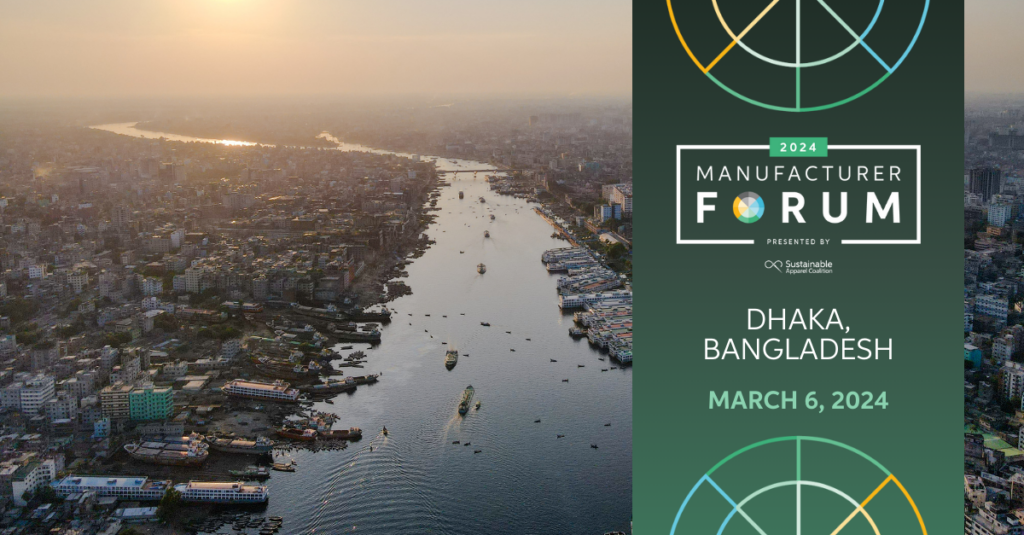
San Francisco, Amsterdam, Hong Kong – February 14, 2024: The Sustainable Apparel Coalition (SAC) will host its first Manufacturer Forum of 2024 on March 6 in Dhaka, Bangladesh; the event will be held alongside the Sustainable Apparel Forum, which will be hosted by the Bangladesh Apparel Exchange on March 5. Reflecting the theme “Catalyst for Change,” the Manufacturer Forum: Dhaka will underscore the pivotal role of manufacturers to set and achieve goals that are transforming the consumer goods industry, highlighting the unique challenges they face and providing support for collaborative solutions.
Over 200 attendees are expected at the Manufacturer Forum: Dhaka, where they will gain insights into the newly launched Manufacturer Climate Action Program (MCAP), the Higg Index suite of tools, and critical policy developments. Participants can also receive hands-on training in and get certified in setting Science-Based Targets (SBTs) for decarbonization, as well as join interactive workshops on completing the Higg Facilities Environmental Module (FEM) 4.0, health and safety remediation plans, and workers rights.
“We are thrilled to host our inaugural Manufacturer Forum of 2024 in Bangladesh and privileged that such an important sourcing hub, known for its craft and expertise, will be the first place we will showcase a new era for the SAC,” said Andrew Martin, executive vice president, SAC, who will give the opening address. “Solving complex sustainability challenges requires a holistic approach that depends on data, tools, and stakeholder collaboration. Manufacturers are the engine that drives the consumer goods industry and this event in Dhaka provides invaluable opportunities for connection, learning, and support as we work together to take collective action for industry progress.”
In 2023, the SAC announced the return of its flagship Manufacturer Forums after a hiatus of in-person events amid the pandemic. Since then, the SAC held its July forum in Shenzhen, China followed by Bangalore, India in December. The events bring together manufacturers – who are on the front lines of critical action – with business leaders and stakeholders to discuss the future of sustainability, supply chain compliance, verification, policy alignment, and more.
“SAC’s Manufacturer Forums are a valuable opportunity to connect and take action on the goals that unite us,” said Arindama Banerjee, associate director, client services/responsible sourcing at ELEVATE – An LRQA Company, the industry leader in sustainability and supply chain services globally. “We are thrilled to participate again this year.”
Dr. Vidhura Ralapanawe, executive vice president, Epic Group and SAC board director, and Dr. Laxmikant Jawale, regional lead, South Asia & Southeast Asia, Apparel Impact Institute (Aii), will speak at the event. Additional speakers include SAC global team members and SAC members Primark, ELEVATE, a LRQA Company, and CYCLO® recycled fibers, among others. Representatives from organizations with which SAC collaborates, including Bangladesh Apparel Exchange (BAE), Bangladesh Garment Manufacturers and Exporters Association (BGMEA), Deutsche Gesellschaft für Internationale Zusammenarbeit (GIZ) GmbH, and the Social & Labour Convergence Program (SLCP), among others, will also present.
SAC’s Manufacturer Forum: Dhaka is sponsored by Worldly, the leader in environmental and social impact data capture and analytics for the apparel and footwear industry, and the exclusive platform for the SAC’s Higg Index suite of tools; those interested in sponsorship can contact sacmeetings@apparelcoalition.org. The full list of speakers, as well as information on registration, is available on the SAC’s website. Collaborative opportunities at Manufacturer Forum: Dhaka are critical to driving equitable and restorative business practices related to the SAC’s three core pillars: Combat Climate Change, Decent Work for All, and Nature Positive Future.
— END —
About the Sustainable Apparel Coalition
The Sustainable Apparel Coalition (SAC) is a global, non-profit alliance of over 300 organizations in global apparel and consumer goods. Initially formed to create standardized sustainability metrics, the SAC has sharpened its focus to driving pre-competitive, collective action across three foundational pillars. As an independent entity, the SAC brings together brands, retailers, manufacturers, NGOs, academics, and industry associations to combat climate change, ensure decent work, and contribute to a nature-positive future. Central to the SAC’s mission is the Higg Index, a suite of comprehensive tools that empower members to measure, evaluate, and improve sustainability performance across the supply chain. To support evolving industry needs, the SAC also brings together a focus in policy, transparency, and programs for collective action.
Discover how a leading international clothing retailer utilizes Higg FEM and Higg MSI to shape their decarbonization strategy and pave the way for meaningful change.
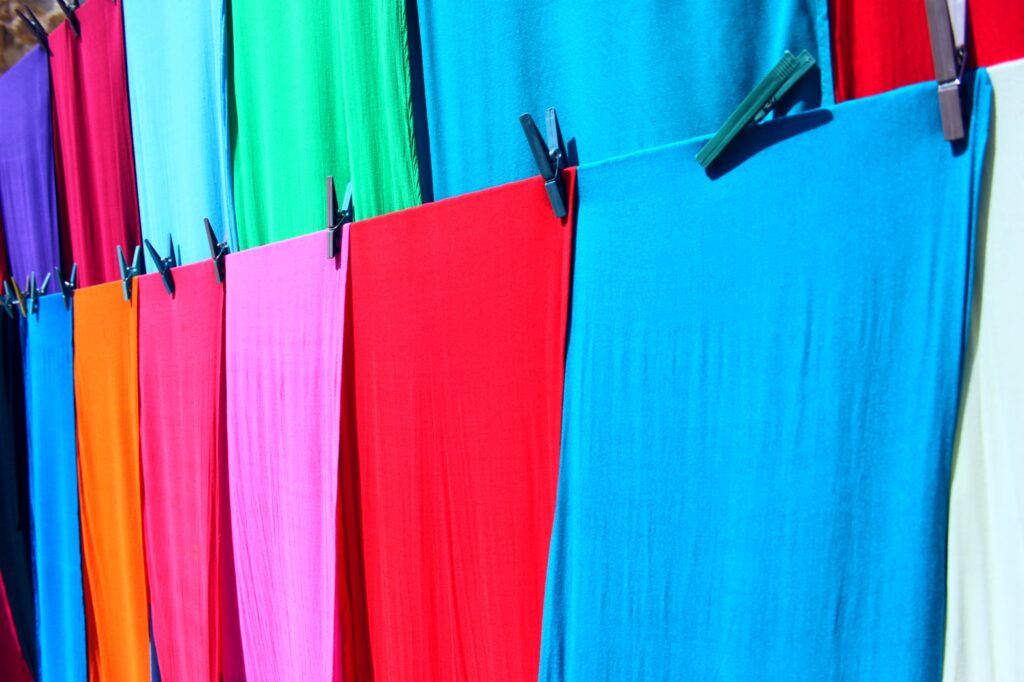
— Dan Roe, Climate Change Programme Senior Manager, Primark.
Primark, a leading international clothing retailer employing over 75,000 people in 16 countries, launched Primark Cares, their sustainability strategy, in 2021. Over the past three years, the company has focused on developing a decarbonization program for its value chain, with their headline target looking at a 50 percent reduction in absolute Scope 1, 2, and 3 emissions by 2030 from an FY19 baseline. A significant milestone, Primark’s science-based targets received validation from the Science Based Target initiative (SBTi) in 2023, showcasing their commitment to align with global efforts to combat climate change.
In addressing emissions from their own operations, the company committed to reducing energy use in their retail locations and incorporating renewable energy. However, a substantial 97.5 percent of their base year carbon emissions occurred in their supply chain. As a result, Primark is focused on collaborating with suppliers to address emissions and reduce their carbon footprint. Utilizing the Higg FEM and Higg MSI tools enables Primark to understand and measure the environmental impacts of their supply chain.
The Higg FEM serves as a key source of supply chain primary data, empowering Primark to calculate a more precise carbon footprint. This tool captures the outcomes of emissions reduction initiatives targeting facilities in their supply chain and demonstrates progress toward their overarching decarbonization target. Notably, in 20221, 1,083 of Primark’s supplier facilities completed the Higg FEM self-assessment, with 590 sites undergoing verification of their self-assessments and achieving an average score of 56 percent. These scores offer valuable insights, enabling factories to pinpoint opportunities for enhancing environmental performance. In addition to the Higg FEM, Primark also leverages data and insights from the Higg MSI to calculate supply chain emissions. This tool provides valuable LCA data specific to the materials and goods procured by Primark.
Since joining Cascale in 2015, Primark has worked with their supply chain partners to adopt the Higg Index to assess environmental impact. With the roll-out of the Higg Index across their supply chain, the company embraces a standardized measurement of environmental sustainability performance, enabling continuous improvement efforts.
1 Figures refer to Higg FEM modules covering 2022 calendar year data.
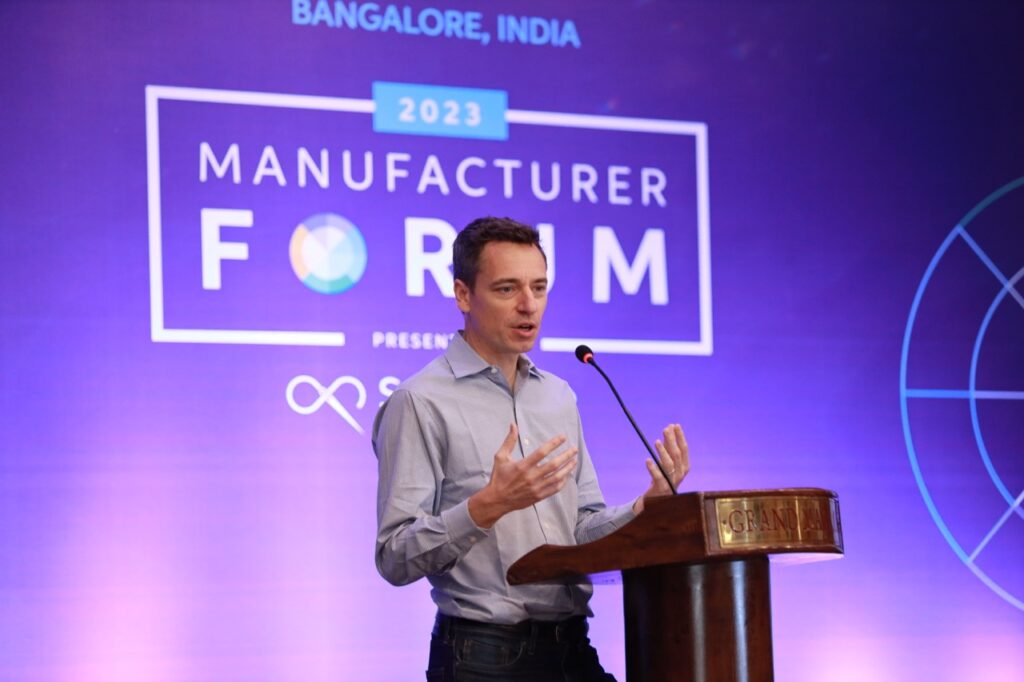
Over 200 in-person attendees joined the Sustainable Apparel Coalition (SAC), for the second edition of its Manufacturer Forum, on December 4, 2023 in Bangalore, India. Building on the theme, Catalysts for Change, the event brought together business leaders and stakeholders to discuss the future of sustainability, supply chain compliance, verification, policy alignment, and more.
“The use of the Higg Index tools is just one step of many that we must take to solve the most complex sustainability challenges for the sector,” said Jeremy Lardeau, vice president Higg index at the SAC. “This is why we do not stop at delivering data and tools, but also develop programs and events like Manufacturer Forums, where stakeholders can come together and take collective action for industry progress.”
Dr. Vidhura Ralapanawe, executive vice president at Epic Group and an SAC board director delivered a thoughtful keynote, calling for urgent action to combat climate change. “How much we do, and how fast we work to decarbonize, and how much we aspire to achieve is on us. Because climate change is not happening in 2030 or 2050, it’s happening now. This is our chance, our choice,” Ralapanawe said.
Dr. Laxmikant Jawale, regional lead for South Asia & Southeast Asia at the Apparel Impact Institute (Aii), and Erlinda Lee, director of global membership development from the SAC, delved into a discussion that explored the dynamic collaboration between the SAC and Aii. The session allowed attendees to gain a deeper understanding of the mission, purpose, and collaborative efforts of both organizations to propel the industry forward. It also provided valuable knowledge on how to leverage programs offered through the partnership to effectively tackle the challenges associated with decarbonization and how manufacturers can get involved
Later that day, sessions explored critical issues including climate change, how policy and legislation impacts manufacturers, and the evolving landscape of sustainability verification.
Ringo Yu, manager of the SAC’s Manufacturer Climate Action Program (MCAP) highlighted the compounding impact of climate change, such as how extreme heat waves, torrential rain, and flooding impacts India’s community, natural environment, and economy. He shared that there’s currently a low level of science-based target adoption in the apparel, footwear, and textile sector. He shared insights on the newly launched program and how the SAC is spearheading and amplifying industry initiatives for combating climate change. The program aims to accelerate the number of manufacturers at corporate level to set science-aligned targets for scope 1 and 2, enhance their understanding on climate change related risks, and explore opportunities to take climate actions. “It is important to pursue a leadership mindset first and take action individually to drive change collectively by participating in programs such as the MCAP,” Yu said.
Gauri Sharma, assistant general manager of communications and sustainability innovation at Shahi Exports Pvt Ltd. joined Mousumi Sarang, country manager for India at the Fair Wear Foundation to discuss the intricacies of current and future policy challenges in the textile industry. ”Legislations built and shaped in the Global North have a deep cascading effect in the supply chain, Sharma said. “Hence in the Global South, it is important to develop an understanding of what these means for manufacturers.”
Angela Ng, director of Higg Facility Tools at the SAC, Janne Koopmans, head of collaboration at ZDHC, and Yashinth Wijerathne, manager of environmental sustainability at Hirdaramani Apparel, discussed the recently launched Higg FEM 4.0 and its vital role in standardized measurement and accurate reporting. “The Higg FEM 4.0 allows manufacturers to see what is really important and evolve from there,” Ng said.
Dhawal Mane, director of training and verification at the SAC, and Jeremy Lardeau, SAC vice president of Higg Index, presented on the evolving landscape of sustainability verification within the industry. “Higg FEM verification growth over the past 5 years has demonstrated the collaboration of SAC members on a shared environmental assessment. It is time to simultaneously invest in value through evolving our approach for verification. Our Core verification approach this year is the first step in that direction,” Mane said.
Attendees also received training to support their Higg FEM 4.0 self-assessment, get certified in setting Science-Based Targets, and develop plans for health and safety remediation and workers rights.
The SAC announced the return of Manufacturer Forums earlier this year, with the first in-person event taking place in Shenzhen, China on July 25 at Sheraton Shenzhen Futian Hotel. This was the first in-person Manufacturer Forum the SAC had hosted since 2019.
The Bangalore Manufacturer Forum online photo gallery is available here. Manufacturers who are interested in participating in an upcoming Manufacturer Forum can click here to subscribe for updates.
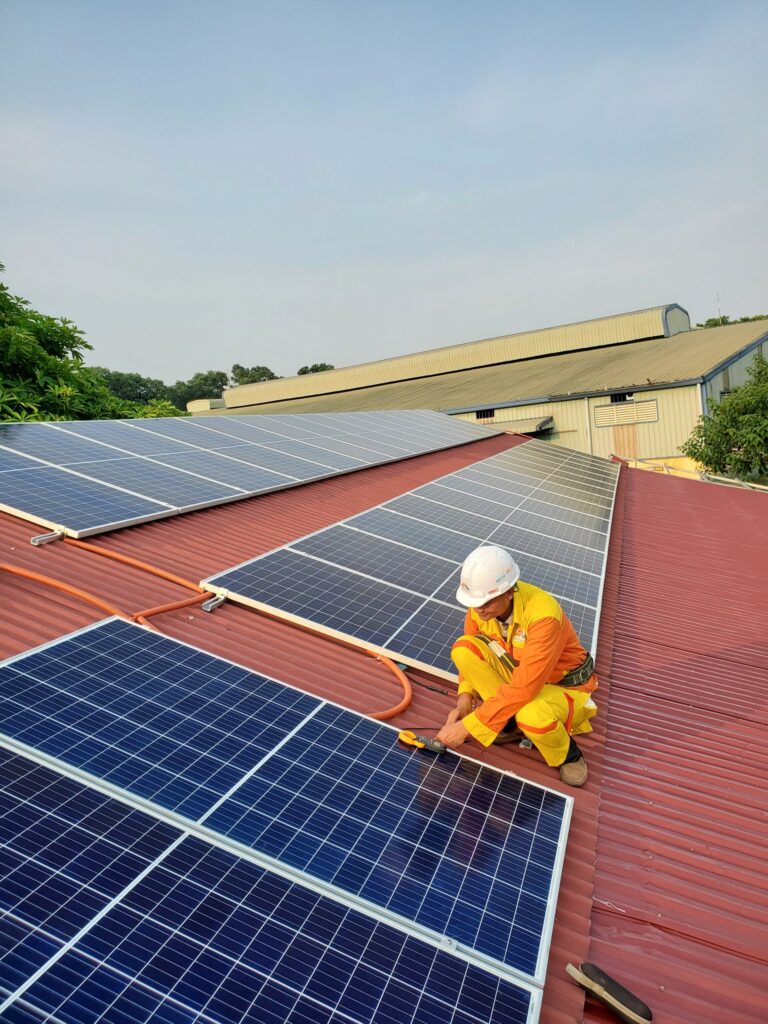
Joyce Tsoi, SAC director of Collective Action, co-hosted an in-person and virtual meetings in Vietnam and Cambodia to kick off the SAC x Project Development Programme (PDP), which aims to develop and scale rooftop solar photovoltaic project(s) to manufacturing facilities in Vietnam and Cambodia. Implemented by Deutsche Gesellschaft für Internationale Zusammenarbeit (GIZ) GmbH, the Project Development Programme (PDP) is an integral part of the German Energy Solutions Initiative. Coordinated and financed by the German Federal Ministry for Economic Affairs and Climate Action (BMWK) it aims to globalise German and European technologies and expertise in climate-friendly energy solutions. The PDP combines development cooperation with private-sector engagement to foster partnerships between local businesses and trusted providers of climate-friendly energy solutions, creating mutually beneficial outcomes and advancing the energy transition in its cooperation countries. Simultaneously, German and European providers benefit by easing their market entry into developing and emerging countries.
In Vietnam, the meeting also included a presentation from Eunice Doan, energy advisor and Country Representative of PDP Vietnam, and Lucia Hoang, regional manager of CSR Southeast Asia for Bureau Veritas, a world leader in laboratory testing, inspection, and assessment services. In Cambodia, presenters included Vabotra Chea, Technical Advisor and Country Representative of PDP Cambodia, and Rijan Shrestha, Technical Advisor and Country Manager of PDP Cambodia.
At both meetings, Tsoi shared information about the SAC’s Collective Action team, which oversees the development of its Decarbonization Program in support of the organization’s goals to achieve a 45 percent greenhouse gas (GHG) emission reduction in line with science-based targets (SBTs) by 2030 — and to zero by 2050. The SAC launched the Decarbonization Program in 2022 and integrated SBTs into SAC’s membership requirements in 2023, with over 50 percent of members having taken this action to date. “We believe that this is the most credible and ambitious approach, backed by the latest climate science,” Tsoi said. “SBTs have become fundamental expectations for companies globally in multiple industries and we want to enable our industry towards a low carbon transition by shifting from heavily fossil fuels use to adopting renewables or low carbon sources.
To achieve these goals, the SAC partnered with Textile Exchange and Zero Discharge of Hazardous Chemicals (ZDHC) to form the Apparel Impact Institute (Aii), creating a connected, end-to-end path to action for the entire apparel and footwear industry. The Collective Action team is committed to activate the SAC’s ecosystem for action and announced the launch of the Manufacturer Climate Action Program (MCAP) in September of this year. Designed in collaboration with NIKE and Target Corporation, the MCAP is a critical component of the SAC’s Decarbonization Program efforts to catalyze support and drive the sector toward ambitious yet necessary CO2 emissions reductions. Tsoi also shared the four key elements that form the core of MCAP, empowering manufacturers to define their scope 1 and 2 science-aligned targets, immediately take critical action to reduce their direct and indirect emissions and improve operational efficiency in order to advance industry goals.
During the Vietnam meeting, Tsoi used data accessed through the SAC’s Higg Facility Environmental Module tool in order to break down the mix of energy sources at manufacturing sites both globally and in Vietnam; the use case illuminated the sector’s dependence on fossil fuels. Over 80% of energy usage in 1253 facilities in Vietnam are from fossil fuels. Only 12.4% of energy comes from renewable energy sources. She also shared data on renewable energy adoption around the globe and was able to show Vietnam is a progressive country to increase its renewable energy capacity to sustain the growth of its industries. Following Tsoi’s presentation, Hoang shared the service offerings of Bureau Veritas Vietnam, which can support manufacturers in conducting life cycle assessments (LCAs), performing energy diagnosis services and consulting for GHG calculation and setting SBTs. Doan then explained the support and services offered to facilities by PDP, which guides facilities through the development process of solar PV technology and the selection of system size; service provider, equipment, and best investment scenario. These include technical evaluation, investment appraisal development, solar power implementation, and introduction to financing opportunities with preferential loan interest rates.
At the Cambodia meeting, Vabotra explained that with an average daily solar radiation of 5 kWh/m2 and average sunshine of 8 hours per day, Cambodia is one of the Southeast Asia countries that has high solar potential. He also discussed the regulatory landscape in terms of the history of Cambodia’s solar development, options to deploy renewables based on the Ministry of Mines and Energy (MME)’s updated principles of permitting the use of rooftop solar power. Rijan followed with an explanation of how the PDP team can support manufacturers in technical evaluation, investment proposals, and project implementation.

Jeremy Lardeau, vice president Higg Index at the Sustainable Apparel Coalition (SAC), joined the “Net Zero and Well-Being in Life” virtual workshop jointly organized by the G20 Presidency of India and the G7 Presidency of Japan, and hosted by Boston Consulting Group. The objective of the workshop was to share good practices on demand-side politics and business initiatives, fostering efforts to accelerate changes in consumer lifestyles and behaviors related to climate change and the environment. Attendees included governments, businesses, and organizations from G7/G20 countries and the European Union.
The panel was moderated by Makoto Morihara, Managing Director & Partner at Boston Consulting Group. In addition to Lardeau, it included Kawamata Kotaro, Director, International Strategy Division, Global Environment Bureau, MoE Japan; Nameeta Prasad, Joint Secretary to the Govt of India, Ministry of Environment, Forest and Climate change, India; Seema Arora, Deputy Director General, Confederation of Indian Industry; Nicolina Lamhauge, Coordinator, Environmental Policies, Social and Distributional Outcomes, OECD Environment Directorate; Kiwamu Inoue, Assistant Manager, External Relations Department, Tokyo office, DAIKIN INDUSTRIES, LTD; Valérie TO, Project manager at the sustainable agriculture and food office, Department of the Commissioner General for sustainable development, Ministry for an Ecological Transition and Territorial Cohesion, France; Frederico Akira Campos, Country Manager, Braskem Japan, Braskem; Claire Poole, CEO, Sport Positive; And Rohan Sheth, Chief of Staff, Olio Exchange Limited.
Lardeau presented an overview of the SAC’s Higg Index tools as a common sustainability performance language, then dove into the use of environmental footprint data for on-product claims and labels. He noted that environmental footprint labels may not be as effective to drive positive change up the supply chain, and referenced a 2020 Compare Ethics study which found that only 20 percent of consumers trust eco labels. Lardeau shared that beyond footprint data, consumer education and engagement is key to better environmental outcomes in the apparel industry. “We believe that over the long term, some well-intentioned design decisions and efforts not to overburden consumers with heavy or scientific terminology have resulted in communications which are not radically transparent or have allowed for lower levels of consumer literacy on important issues in product design or manufacturing,” Lardeau said. Finally, he warned that an unregulated space breeds potential for greenwashing, but also greenhushing, so it is paramount that effective and harmonized regulation provide certainty and credibility to product environmental claims.
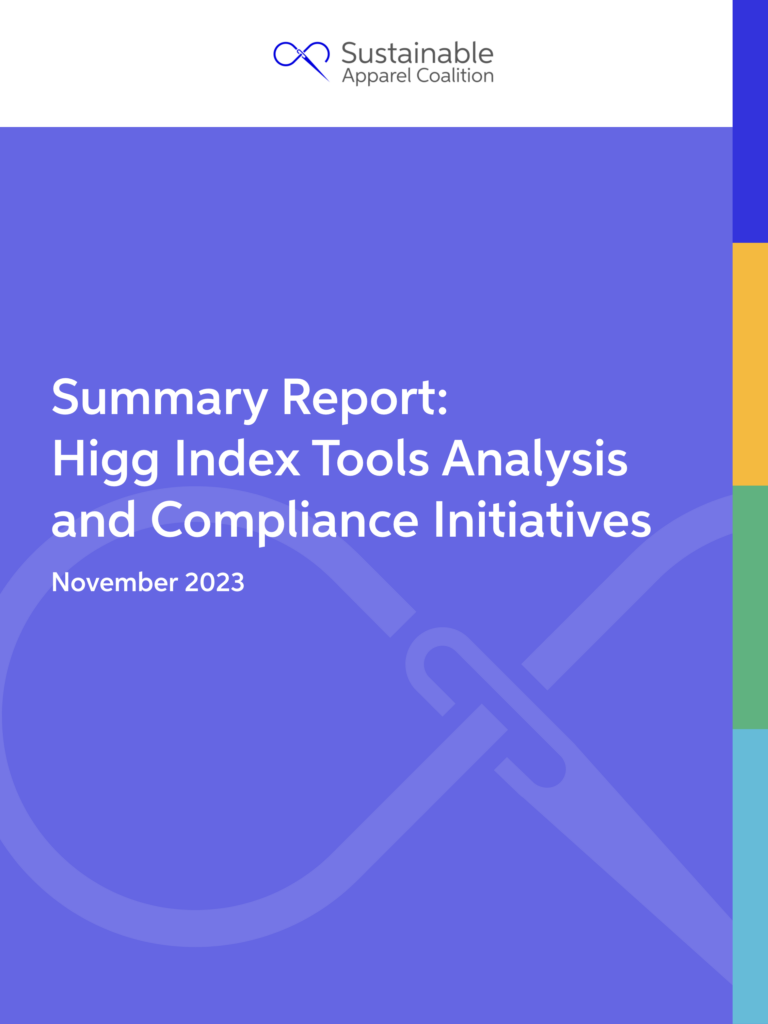
Developed in partnership with the Global Fashion Agenda, the Sustainable Apparel Coalition has developed a Higg Index Tools Analysis and Compliance Initiatives Summary Report, which is now available to the public.
In collaboration with professional consultancies and partners, the SAC initiated analyses of the Higg Index tools in relation to relevant existing and upcoming EU and national (European) legislation. The summary provides key messages and main outcomes of the analysis, along with proposed next steps.
As part of this process, the SAC developed an overview for members explaining how relevant European legislation is applicable to the requirements of the Higg Index tools. It intends to map out the complex and rapidly evolving policy landscape, and support members in their compliance work with their own legal and compliance teams.
The initial analysis considered factors such as corporate sustainability due diligence and corporate sustainability reporting and was intended to assess to what extent the Higg Index tools can assist members in their compliance efforts, where appropriate. The SAC is also collaborating with Worldly, an impact intelligence platform that hosts and supports leading industry solutions including the SAC’s Higg Index tools, to deliver a white paper that comprehensively outlines how brands can use the tools to prepare for compliance with the European Corporate Sustainability Reporting Directive (CSRD), in particular.
Key messages of the summary include:
As the Higg Index tools touch upon many aspects included in the regulatory and reporting obligations, the purpose of the collaborative work is to keep abreast of the latest key regulatory developments. This helps in considering potential refinements to the Higg Index tools in the future. Relevant legislation is constantly changing, and many pieces of legislation have yet to be finalized. Hence, the analysis will be conducted continuously, so the Higg Index tools ceaselessly meet the evolving expectations and needs of members and users.
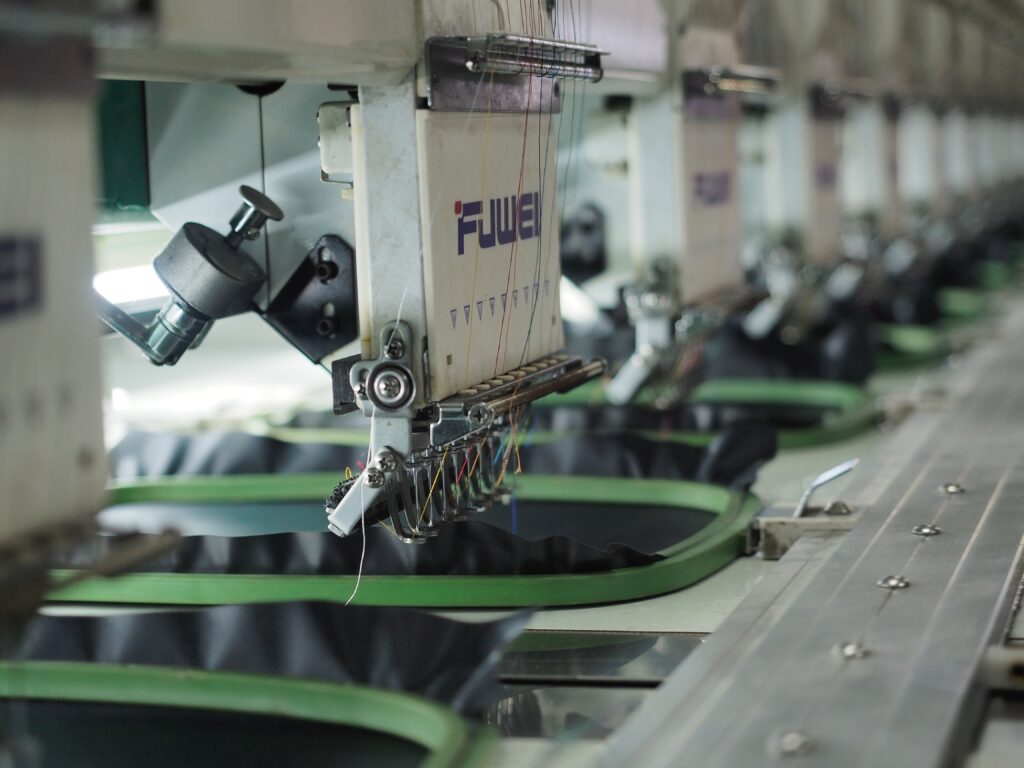
Celebrating the launch of the Higg Facility Environment Module (FEM) 4.0 tool, the Sustainable Apparel Coalition and Worldly hosted a series of webinars for global stakeholders. The presentations illustrated how the updated Higg FEM tool marks an industry milestone in sustainability reporting to meet pressing environmental issues and industry standards, positioning the Higg FEM 4.0 as the leading assessment for environmental performance in the consumer goods industry.
Facilitated by Loretta Tam, vice president of Customer Success at Worldly, the presentation kicked off with Scott Raskin, chief executive officer of Worldly, who conveyed the urgency of value chain participation in light of increased regulatory disclosure. Higg FEM 4.0 aligns with key global standards — including the GHG Protocol, the SBTi, and the ZDHC Roadmap to Zero — to drive emissions reductions and reduce duplicative reporting.
Amina Razvi, CEO of SAC, shared how Higg FEM 4.0 was redesigned to meet industry needs, offering broader coverage of critical environmental issues, such as groundwater and soil contamination, to help facilitate improvements on a global scale. It also features improved and streamlined usability by including targeted questions relevant to facilities. Additionally, Higg FEM 4.0 unveiled a new anomaly detector designed to flag inconsistencies on-platform. The result, Razvi shared, is a tool that delivers better data quality and a more accurate environmental assessment.
Jeremy Lardeau, VP of Higg Index at SAC, presented on the specifics of the tool’s design during the first webinar, which was timed for participants from the Americas, Europe, the Middle East, Africa; on the second, timed for participants from the Asia-Pacific region, this information was shared by Angela Ng, director, Higg Facility Tools at SAC. They were joined by John Armstrong, chief technology officer at Worldly, who presented on user experience, and Eustaquio Brant, environmental program manager at Bestseller, who shared the brand’s experience with Higg FEM 4.0.
The participants emphasized that the teams engaged 140 representatives across 12 Member Expert Teams (METs) to collect stakeholder feedback, spending two years on the process of building Higg FEM 4.0. Stakeholders on the METs represented 62 manufacturers, 57 brands/retailers, 10 service providers, and five affiliate members, and provided insights that helped to shape the FEM framework, scoring methodology, question content, and more, to build a tool that meets relevant industry standards and protocols. Finally, the webinar sessions outlined how Higg FEM 4.0 was tested by more than 400 users, who provided feedback within the platform. After a Q&A session, each webinar concluded with the understanding that Higg FEM 4.0 empowers users to identify, prioritize, and scale sustainability efforts.
As members transition to Higg FEM 4.0, the SAC and Worldly will host additional member and user webinars and Office Hours throughout the month.

Jeremy Lardeau, vice president of Higg Index at the Sustainable Apparel Coalition, joined a recent panel hosted by Worldly, an impact intelligence platform that is the exclusive licensee of the SAC Higg Index Tools, to discuss how brands can prepare for Corporate Sustainability Reporting Directive (CSRD), which requires all large and listed companies (except listed micro-enterprises) to report on impacts to people and the environment, detailing how the risks materialize for investors. Lardeau joined John Armstrong, Worldly chief technology officer, and JR Siegel, Worldly senior director of product innovation, to discuss how companies can use the Higg Facility Tools to begin collecting the data in 2024 that they will need to report on ESG impact in 2025.
After Armstrong shared an overview of the changing sustainability landscape, Lardeau detailed the value of the Higg Index to report data and walked through key aspects of a CSRD guide that the SAC and Worldly are currently developing. He discussed how the Higg Index focuses on sustainability areas of high impact including carbon emissions, wastewater and energy among others. Through the Higg Index Tools, businesses can access the insights they will need for impact reduction, compliance and disclosure, Lardeau said.
However, when it comes to reducing carbon emissions, Lardeau noted that the vast majority of a fashion brand’s footprint is in its manufacturing supply chain, especially energy-intensive raw material production, preparation and processing. To that end, the Higg Facility Facility Environmental Module (FEM) tool helps facilities build a comprehensive view of primary energy, water and waste data in order to better understand impact and develop science-based strategies to reduce scope 3 emissions. Lardeau recommended a partnership approach, in which key suppliers can be engaged and incentivized through better purchasing practices, such as faster payment plans and larger orders with greater lead times.
To conclude the presentation, Siegel detailed how Worldly is mapping the CSRD to the Higg Tools and walked through key aspects of the guide.
Read how this American-based performance athletic company uses Higg Product Tools to assess their environmental footprint.

— David Kemp, Director of Corporate Responsibility, Brooks Running
Brooks Running harnessed the power of the Higg Product Tools, including the Higg Materials Sustainability Index (MSI) and Higg Product Module (PM), to gain insights into its environmental impact and build strategies to achieve its climate and environmental commitments. The company used the tools to meticulously assess the impacts of both the raw materials (Tier 4) and processing stages (Tier 2 and 3) that contribute to its product ecosystem.
The Higg Index tools are fueled by collaboration. Brooks Running’s dedicated corporate responsibility team worked closely with suppliers to collect material-specific information – from composition and raw material type to dyeing and finishing methods. In instances where suppliers did not provide enough information, the team utilized the Higg MSI’s default values to ensure comprehensive coverage. Through this work, they were able to assess their environmental impact and identify which materials aligned best with their Planet 2030 commitments. The resulting reporting provided Brooks Running with a more accurate emissions factor for each material’s global warming potential, which was used to improve the accuracy of the company’s corporate Scope 3 Greenhouse Gas (GHG) Protocol emissions reporting.
In addition to their use of the Higg MSI, Brooks Running continued to scale its adoption of the Higg PM – entering footwear and apparel materials into the Higg MSI in order to evaluate the environmental impact of footwear and apparel styles through the Higg PM.